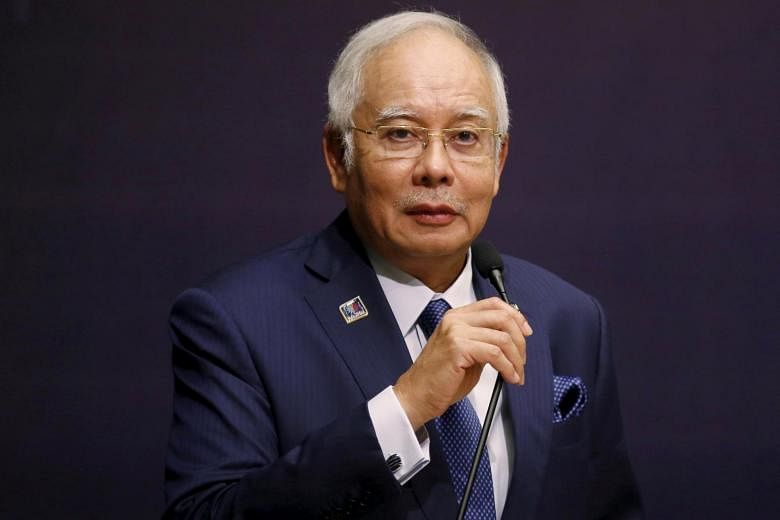Malaysian Prime Minister Najib Razak is expected to dispense more crowd-pleasing financial measures when he unveils Budget 2018 on Friday, backed by a better-than-expected economy and ahead of a general election that is due next August.
"As the 14th general election looms, Budget 2018 will have short-term populist elements," said Maybank IB Research, adding that 2017 saw "real GDP growth recovery" as opposed to the slowdown over the two previous years.
Datuk Seri Najib, who is also Finance Minister, will have to continue appeasing rating agencies and capital markets by fulfilling his vow to cut the fiscal deficit.
But even if he continues to trim the deficit to an expected 2.9 per cent of gross domestic product, he will still have an estimated RM11 billion (S$3.5 billion) more to spend next year, a hike of 4.3 per cent from this year's budgeted RM258 billion, according to RHB Research Institute. This is due to a larger economy and better revenue collection.
Malaysia is set to record faster economic growth this year, with the first half's 5.7 per cent expansion leading most economists to project the full-year increase at well above the government's 4 per cent to 5 per cent range.
And the Treasury is richer due to a stronger economy - the 6 per cent goods and services tax is expected to rake in up to RM3 billion more than its targeted RM40 billion - and higher oil prices. Oil has tracked above the government assumption of US$45 per barrel all year, and currently trades at US$57 per barrel.
The best bet among analysts is for those extra funds to be spent on a bigger BR1M cash handout. This year, RM6.8 billion was allocated to seven million recipients - households with a monthly income below RM4,000 and singles earning less than RM2,000 - who received between RM450 and RM1,200 each. The payout reached more than 3.5 million households, more than half the families in Malaysia.
Maybank IB expects an RM100 increase per recipient, and noted the qualification threshold has been progressively raised since the financial aid scheme was introduced in 2012.
The higher payouts may heighten accusations of vote-buying but, in a pre-Budget message on his blog yesterday, Mr Najib said: "It is frankly cruel-hearted for anyone in the opposition to talk of taking away a programme that is designed to help ease the burden of millions."
This would be the main move to ease anger over this year's rise in inflation, which has been nearly double the 2.1 per cent registered in 2015 and 2016.
Analysts also expect more items to qualify for personal income tax relief, which currently covers payments like insurance premiums, education fees and healthcare bills.
A more popular move would be to reduce the tax rate outright, but the Premier pointed out that since he became Finance Minister in 2008, corporate and personal taxes have dropped from 27 per cent and 28 per cent, respectively, to 24 per cent. "We also raised the tax threshold so that those whose (monthly) income is RM4,000 or below no longer have to pay any income tax - unlike in the past, where those who had salaries of even RM2,000 were taxed," he said in his blog.
Mr Najib may also need to secure key vote banks for his government. There have been grumbles from the 1.6 million-strong civil service, as well as the 1.2 million comprising settlers and their families under Felda, the land development agency mired in controversial deals that have led to billions in losses. An earlier RM1.6 billion pledge of cash and debt forgiveness to Felda families appears to have fallen short of quelling unhappiness, so more incentives could be in the offing.
Other rural vote banks, such as rice farmers and fishermen, could also see increased subsidies, while the urban poor have been promised a fix for housing unaffordability, a top concern since the 2013 elections. Mr Najib has promised RM6 billion will be set aside for low-cost public housing next year.
Not all new spending will be short term, however. Budget 2018 will be themed "Shaping the Future", and will likely dangle long-term projects before voters.
"Mega infrastructure projects would remain in the limelight as a market impactful measure," said UOB-Kay Hian's head of research Vincent Khoo. The bulk of these would be transport-related, like the ongoing MRT and LRT expansions in the Klang Valley, as well as further rollout of works for the East Coast Rail Link and Pan-Borneo Highway.

